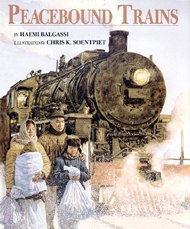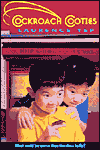| copyright 2003 by Lois June Wickstrom
Awake and Dreaming by Kit Pearson
 Theo
hates being poor. Her father doesn’t know she exists. Her mother is a
low-paid waitress who doesn’t make enough money to buy food and
clothing, and pay the rent. Her mother hits her and yells at her and buys
cigarettes for herself instead of shoes for Theo. Theo’s only happy
times are when she dreams of having a nice family like the ones in books. Theo
hates being poor. Her father doesn’t know she exists. Her mother is a
low-paid waitress who doesn’t make enough money to buy food and
clothing, and pay the rent. Her mother hits her and yells at her and buys
cigarettes for herself instead of shoes for Theo. Theo’s only happy
times are when she dreams of having a nice family like the ones in books.
Theo spends so much time in her imagination, that it is
not surprising she befriends a ghost. This ghost was a children’s author
who died with one book unwritten.
Theo’s mother’s new boyfriend doesn’t like
children. Her mother sends her to live with an aunt in Victoria. While on
the ferry to Victoria, Theo sees the ghost, and then magically becomes
part of her ideal family. Things quickly become dull for the reader when
only nice things happen to nice people, and nobody has problems. Theo’s
only problem is wondering if she is having a dream. Then suddenly she is
back on the ferry to Victoria, and she must go to live with her aunt.
But, her dream family also lives in Victoria. And Theo
investigates. The house she lived in exists. The family she was part of
lives in that house. And her ghost lives in the cemetery near the house.
But the family is composed of real people who fight and argue and have
problems. And none of them remembers her. However, just as in her dream,
they do befriend her.
Then Theo’s mother breaks up with her boyfriend and
comes to Victoria to take her back. Theo doesn’t want to go. She has
gotten used to regular meals, a warm house, and having friends. She meets
with her ghost friend again. Then, the story takes a turn that leaves a
puzzle for the reader – is Theo having another fantasy, or has her life
truly become better? Theo gives her mother orders, and instead of hitting
her, her mother obeys. Theo’s friends from different parts of her life
befriend each other and her mother takes a good job and rents a warm
apartment. All appears to be ending on a happy note – but that’s what
happened last time Theo was awake and dreaming.
This book is the winner of the Canada Council for the
Arts Governor General’s Literary Award, and the Ruth Schwartz Children's
Book Award which is voted by school children who name their favorite book
of the year.
This book is available as both an ebook and a treebook.
You can read the ebook for free online at: http://korea50.army.mil/peacebound/index.html
Peacebound Trains by Haemi Balgassi
illustrated by Chris K. Soentpiet
 Sumi
loves to watch the trains as they roll by her grandmother's house every
afternoon. One day her mother will be on the train, coming home from the
Army. Sumi's grandmother comes to sit with her on her favorite rock and
watch the trains. Sumi
loves to watch the trains as they roll by her grandmother's house every
afternoon. One day her mother will be on the train, coming home from the
Army. Sumi's grandmother comes to sit with her on her favorite rock and
watch the trains.
Grandmother, Harmuny in Korean, tells Sumi the
story of another train she took long ago when she escaped North Korea
during the war. Harmuny was a young mother. Sumi's mother was a baby in
her arms.
Using poetic language, and illustrated by loving and
detailed art, Peacebound Trains explains the devastating effects of
war on family and country in language a child can understand. While this
story is fictional, it is based on the story that the author's grandmother
told her. Haemi Balgassi incorporates Korean vocabulary smoothly into the
story, and the art depicts Korean dress of the time. Deftly weaving the
specifics of the Korean conflict with the universality of family, this
story is a good way to get your children thinking and talking about war.
Cockroach Cooties by Lawrence Yep
 Most children have to deal with a bully at their school.
Teddy and his little brother Bobby live in San Francisco’s China Town,
and their bully is named Arnie. They call him Arnie-zilla. In this story,
Bobby foolishly gets the bully angry and Teddy jumps in to defend him. The
nuns at their school step in to save Teddy a few times, but Arnie warns
that the nuns won’t always be around. And he has plans to pummel them
every day for the whole school year. Most children have to deal with a bully at their school.
Teddy and his little brother Bobby live in San Francisco’s China Town,
and their bully is named Arnie. They call him Arnie-zilla. In this story,
Bobby foolishly gets the bully angry and Teddy jumps in to defend him. The
nuns at their school step in to save Teddy a few times, but Arnie warns
that the nuns won’t always be around. And he has plans to pummel them
every day for the whole school year.
Throughout the rest of the story, the threat of Arnie is
as real as the cable cars and small shops in China Town. The threat looms
in the background as the boys buy a birthday present for their mother,
visit the weird bug lady next door, and eat dinner at a Chinese restaurant
where a leaky pipe is treated like a waterfall. The scenes with Arnie test
the brothers loyalty to each other, as well as their ingenuity. Teddy
feels that as the big brother, he must protect Bobby, even if it means
getting a broken rib, like Arnie gave one of the other boys. But he also
tells Bobby that having a little brother is like having a stone around his
neck.
Lawrence Yep, author of this book, is married to Joanne
"Spider" Ryder, a nature poet, and author of the just-for-a-day
books in which readers become an animal for a day. Bobby shares Joanne’s
interest in bugs. Much of the humor and pathos in this book comes when
Bobby adopts a cockroach as a pet, and brings it to the bug lady to learn
how to care for it. The only thing Teddy wants at the bug lady’s house
is the cookies, and mysteriously Bobby warns him not to eat them. Like
Joanne, Bobby tries to see things from the bugs’ point of view, and
eventually from the bully’s point of view. Teddy meanwhile, helps the
reader see the world from the point of view of a big brother.
Readers can empathize with Teddy and Bobby as they
explore a world that is both familiar and very different from Sassafras
Hill.
Before I review this book, I should explain that it is
an ebook – that means it is not available in paper, but only
electronically. Ebooks come in forms that can be read on all kinds of
computers, including hand-held ones. You can’t buy them at most stores,
but only on the web, and usually only at their publisher’s website.
Fewer and fewer books are being printed each year, and yet there are more
and more authors writing worthwhile books. Tree books are expensive to
produce, transport to warehouses, and shelve in stores. A publisher of an
ebook only needs to make one copy and put it on a website where it can be
downloaded. No trees, no warehouse, no store shelves. So, an ebook
publisher can afford to publish books that might otherwise never be read.
Some authors epublish their own books. And some ebooks that become popular
on the internet do get picked up by tree publishers and eventually sit on
bookstore shelves.
This ebook is the winner of the 2002 Independent Ebook
Award for Children’s Literature.
The Adventures of Biff and Buff Quite Possibly the
Two Smartest Dogs in the World by Paul J. Gemmer. http://www.double-dragon-ebooks.com/YAdult.html
 Biff and Buff are literate littermates -- Golden
Retriever puppies who talk and read the newspaper and who have a goal of
making the world a better place to have fun. Think about what would happen
if Winnie the Pooh was a dog living in a city, instead of a bear living in
the woods, and you're close. Garrett and Raine's mom didn't want a dog,
but these two puppies were so irresistible that she took them both home. Biff and Buff are literate littermates -- Golden
Retriever puppies who talk and read the newspaper and who have a goal of
making the world a better place to have fun. Think about what would happen
if Winnie the Pooh was a dog living in a city, instead of a bear living in
the woods, and you're close. Garrett and Raine's mom didn't want a dog,
but these two puppies were so irresistible that she took them both home.
These little puppies have amazing powers of persuasion.
They not only get themselves adopted, they tame the cranky ice-cream man,
talk a popular singer into performing a benefit concert for the SPCA,
teach math, and even get along with a cat. Each adventure is a separate
chapter so the book can be used for bedtime stories.
Paul Gemmer writes as if he personally knows these dogs.
By the end of the book, readers will be wondering what they would do if
Biff and Buff moved in with them. Would you take your dog for an art
school exam, and then listen to his explanation of a blank piece of paper
as art? Would you take your dog for a walk with a leash he designed using
your fishing pole? And what would you do if your dog ran up your phone
bill? |

